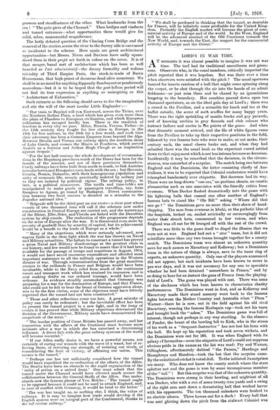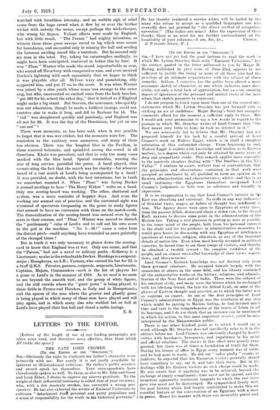LORD'S IN WAR TIME.
AT moments it was almost possible to imagine it was not war time. The turf had its traditional smoothness and green- ness. Observers who, in the usual numbers, critically inspected the
pitch reported that it was hopeless. But was there ever a time when observers were satisfied with the pitch ? The usual sparrows hunted for insects careless of a ball that might come spinning along the carpet, or be shot through the air into the hands of an adroit fieldsman—or just miss them and be chased by an ignominious longstop to the boundary. Hot sunshine poured down upon ten thousand spectators, as on the ideal gala day at Lord's ; there was a crowd in the Pavilion, and a scramble for lunch and tea at the buffet outside, the scene of such scuffles for many happy years.
There was the right sprinkling of muslin frocks and gay parasols, and of knowing urchins in grey flannels and club colours who instruct fathers and uncles in the points of the game. And when that dramatic moment arrived, and the file of white figures came from the Pavilion to take up their respective positions in the field, followed by two famous bats who were to make, or not make, their century each, the usual cheers broke out, and when they had subsided there was the usual hush as the expectant crowd settled down to that enjoyment which is not less intense because so decorous. Incidentally it may be remarked that the decorum. in the circum- stances, was somewhat of a surprise. The match being one between England and the Dominions, the latter consisting chiefly of Aus- tralians, it was to be expected that Colonial exuberance would have triumphed handsomely over etiquette. But decorum had its way. There were no long-drawn " coo-ees," no partisan shouts, no caustic pleasantries such as one associates with the friendly critics from overseas. When Docker flashed dramatically into the game with his lightning balls that caused one after another of England's famous bats to stand like " Ole Bill " asking " Where did that one go ? " the Dominions gave no more than their share of hand- clapping. The men from overseas in khaki, or the pathetic blue of the hospitals, looked on, smiled satirically or encouragingly from under their slouch hats, commented in low voices, and when England was all out for 98 lounged off with the rest of the crowd.
There was little in the game itself to dispel the illusion that we were not at war.. England had out a " star " team, but it did not scintillate more than any two teams brought together for a county match. The Dominions team was almost an unknown quantity save for such names as Macartney and Kelleway; but a Dominions team in the nature of things is always, save to the inner ring of experts, an unknown quantity. Only one of the players announced did not appear, but such incidents have been known to occur in pre-war days, and it was not necessary for any one to speculate whether he had been detained " somewhere in France," and by so doing to hear for an instant the guns of France from the playing- field of Lord's. The game was played with zest. There was none of the slackness which has been known to characterize charity performances. The Dominions went in first, and as Kelleway and Macartney made their stand memory went back to the famous fights between the Mother Country and Australia when " Plum " Warner—there he is now, out in the field against his old rival Macartney, wearing the famous Harlequin cap—took out his team and brought back the "ashes." The Domiriions game was full of interest, though not perhaps in any way startling. In the absence of Fender, the brunt of the bowling fell to Kirk, who in the stress of his work as a "Sergeant-Instructor" has not lost his form with the ball. He kept up his reputation and took seven wickets, and the Dominions were out for 166. It was when England with its galaxy of favourites—even the etiquette of Lord's could not suppress obvious pride in the names as the list was read: Fry and Warner, Gillingham, affectionately dubbed " the Parson," Hardinge and Humphreys and Hendren—took the bat that the surprise came. By the uninitiated cricket is voted dull. To the initiated its surprises are many. Who does not know the county match where the stars splutter out and the game is won by some inconspicuous member of the " tail " ! But this surprise was that of the unknown quantity. The Dominions were strong in their bowling, and mightiest of all was Docker, who with a run of some twenty-two yards and a swing of the right arm sent down a devastating ball that worked havoc with his opponents. The ten thousand onlookers were hushed to an electric silence. Three heroes out for a duck ! Every ball that was sent glinting down the pitch from the stalwart Colonial was
watched with breathless intensity, and an audible sigh of relief came from the huge crowd when it flew by or over the further wicket with nobody the worse, except perhaps the wicketkeeper, who wrung his fingers. Valiant efforts were made by England, but with little result. " The Parson " had mighty intentions, as witness those three great sweeps round to leg which were meant for boundaries, and succeeded only in missing the ball and sending the batsman swirling round like a teetotum. But he secured only six runs in the total. Fry, taking his catastrophes smilingly, as might have been anticipated, contrived to better this by four. It was " Plum " Warner who made the stand, imperturbable as ever, who scored off Macartney with comparative ease, and even received Docker's lightning with such equaniMity that we began to think it was playable after all. McIver, wary and painstaking, ably supported him, and put 17 on. to the score. It was when Warner was joined by a slim youth whose name was strange to the outer ring, but who, asseverated an excited voice from the back benches, " got 203 for his school the other day," that it looked as if England might make a big stand. But Stevens, the newcomer, who quickly won our admiration, though he made a brilliant innings, could not contrive also to make it long, and fell to Barbour for 18. The " tail " was slaughtered quickly and painlessly, and England was all out for 98. It was the day of the Dominions, but yet no one coo-eed " !
There were moments, as has been said, when it was possible
to forget that it was war cricket, but the moments were few. The reminders to the contrary were numerous, and many of them too obvious. There was the hospital blue in the Pavilion, in those reserved balconies, and sprinkled among the crowd in all directions. Khaki was prevalent, and that in only too many cases marked with the blue band. Special constables, wearing the star of long service, patrolled the green. A band played, thus accentuating the fact that the match was for charity—for whoever heard of a test match at Lord's being accompanied by a band ! It was provided, no doubt, with the best intentions, but in truth we somewhat resented it. When " Plum " was facing Docker it seemed sacrilege to hear " The Merry Widow " waltz on a band. Only one scoring-board was working. The other, shuttered and eyeless, was a mute reminder of happier days. And even the working one seemed out of practice, and the unwonted sight was witnessed of spectators trespassing on the green to study figures that seemed to have no connexion with those on the match-cards. The demoralization of the scoring-board was noticed even by the stars in their courses, and " Plum " Warner was moved to disturb the " gentlemanly " calm of Lord's and to call out his own score to the god in the machine. " No. 1-16 !" came a voice from the distant pitch—could anything have reminded us more pointedly
of the changed times ?
But in truth it was only necessary to glance down the scoring-
card to know that England was at war. Only one name, and that the "Parson," had not a naval or military prefix—Kelleway is a Lieutenant; so also is therecloubta.ble Docker. Hardinge is a sergeant- major ; Humphreys, an A.B. ; Yeoman, who carried his bat for 22, is a Staff Q.M.S. Privates, gunners, corporals, sergeants, Lieutenants, Captains, Majors, Commanders—such is the list of players for a game at Lord's in the summer of 1918. As we read it we seem to see beyond the smooth turf, and the group of white figures, and the still crowds where the " great game " is being played, to those fields in France and Flanders, in Italy and in Mesopotamia, and the spaces of the seas where the greater and ghastly game is being played in which many of these men have played and will play again, and in which many also who wielded bat or ball at Lord's have played their last ball and closed a noble innings.
E. B.











































 Previous page
Previous page